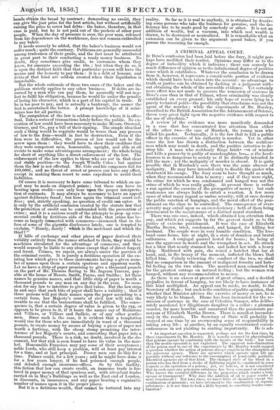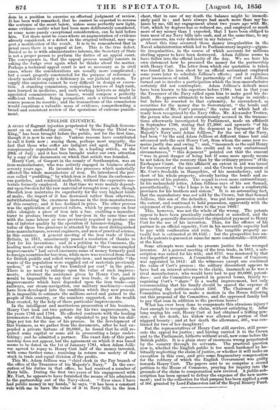A CRIMINAL APPEAL COURT.
Iv Dove's confession had been laid before the Jury, it might per- haps have modified their verdict. Opinions may differ as to the degree of imbecility which it indicates ; there can scarcely be much difference of opinion as to the infinitesimal degree of positive sense which it establishes. Whatever the conclusion to be drawn from it, however, it represents a considerable portion of evidence which should have been taken into the account : no advantage to truth or ,justice can be obtained by dashing at a judgment with- out obtaining the whole of the accessible evidence. Yet certainly more effort was not made to procure the remission of sentence in Dove's case than in that of Palmer, whose criminality was clearly established on every ground ; his only hope of rescue lying in a purely technical point—the possibility that strychnine was not the agent of the murder ; while the experiments of Mr. Horsley, described to the British Association for the Advancement of Science, throw very great light upon the negative evidence with respect to the use of strychnia.'
A review of the evidence was more manifestly demanded in a case that has concentrated less attention than either of the other two—the case of Murdock, the young man who killed his gaoler. Technically, it is the law that to kill a public officer in the exercise of his authority is murder. Yet in other cases the law has drawn a distinction between the reckless- ness which may result in death, and the positive intention to de- stroy life. A man who recklessly flings brick, ^nt of window and kills a passer-by is guilty of manslaughter, beee....ie the heed- lessness is as dangerous to society as if he distinctly intended to kill the man ; yet the malignity of murder is absent. It is quite possible that in Murdock's case there was the same absence of malignity. He may have intended only to disable the gaoler who obstructed his escape. The Jury seem to have thought as much, when they recommended him to mercy ; and if they were right, the crime for which he was condemned and hanged was not the crime of which he was really guilty. At iiresent there is rather a run against the exercise of the prerogative of mercy ; but such tendencies are always liable to entail a reaction. A few more cases of what many regard as undue severity; will at once destroy the public sanction of hangings, and the moral effect of the pun- ishment on the class to be controlled. The consequence of over- severity may entail upon us an over-leniency ; both of them being detrimental to the maintenance of a distinct moral standard.
There was one ease, indeed, which obtained less attention than any, and which yet suggests by far the gravest doubt as to the Mjustice of extreme punishment. It was the ease of Elizabeth artha Brown, tried, condemned, and hanged, for killing her husband. The couple were in very humble condition. The hus- band came home, late at night, in a state of drunken and brutal sullenness. A conjugal quarrel lasted for hours ; he being at once the aggressor in words and the wrongdoer in act. He struck her a blow that nearly, stunned her, and lashed her with a heavy whip. Maddened with pain, she seized a hatchet that lay at hand, and, in the frenzy of the moment, inflicted the blows that killed him. Calmly reviewing the conduct of the two, we shall find no comparison in the amount of malignant ferocity and hate- ful feeling on the two sides. The murdered man committed by far the greatest outrage on natural feeling ; but the woman was hanged, without any recommendation to mercy. As there is an excess at present of great crimes, and a decided prejudice in favour of hanging, we are likely to have instances of this kind multiplied. An appeal can be made, no doubt, fo the Secretary of State ; but such is the condition of public opinion, that whether that Minister advises the exercise of mercy or not, he is very likely to be blamed. Blame has been insinuated for the re- mission of sentence in the case of Celestina Sommer, who delibe- rately murdered her illegitimate daughter in a cellar ; a planned murder, far more horrible and unnatural than the passionate pa- roxysm of Elizabeth Martha Brown. There is manifest inconsist- ency in the results. The Secretary of State will probably be swayed at one time by an overweening sense of responsibility in taking away life ; at another, by an equally overstrained consci- entiousness in not yielding to canting importunity. He is sel- * An important question is suggested, perhaps not for the first time, by these experiments by Mr. Horsley. It is usually assumed by physiologists, that poisons operate by combining with the tissues of the body : but even then the modus operandi is not explained. The apparent non-diminution of the poison used in one'of the experiments by Mr. Horsley would suggest a question whether the action of poisons always consists in the absorption of the poisonous agency. There are agencies which operate upon life ap- parently without any reference to the consumption of ponderable particles. Electrical agencies are of that kind. The changed state of the blood in a person who has died from a stroke of lightning might be considered in some respects as the operation of a poison; yet, we believe, it is not considered that in such cases any poisonous suatance has been consumed or absorbed. Who knows the essential difference in the properties which render a body opaque or transparent ? Why does the addition of oil to paper render it more translucent ? Not long since, we kiiew little of chemistry except the combination of minerals ; we have advanced to the combination of organic substances : is it not time to look a little beyond, to something besides-coin, bination? dom in a position to exercise an effectual judgment of review. It has been well remarked, that he cannot be expected to reverse the sentence of the court below, unless some perfectly new light, some evidence unlike what had been more deliberately considered, or some more purely exceptional consideration, can be laid before him. Yet there must be cases where an augmentation of evidence already considered, or a defect in the original tribunal, may sug- gest a modification of the result. It is to be remembered that in penal cases there is no appeal at law. This is the true defect. Busied as he is with administrative labours, the Secretary of State is not a proper person to perform the duties of an appeal court. The consequence is, that the appeal process usually consists in asking the Judge over again what he thinks about the matter. Perhaps a technical appeal court is not so necessary as in civil cases, where the considerations are usually more complicated ; but a court properly constructed for the purpose of reference is clearly needed to supply a deficiency in our judicial system. To supply this omission cannot be very difficult in design or execu- tion. A standing commission, comprising lawyers of high rank, men learned in medicine, and such working lawyers as might be appointed commissioners in lunacy, would compose a perfectly, sufficient tribunal. Being permanent, such a tribunal would of course possess its records ; and the transactions of the commission would constitute a valuable mass of evidence, comprehending a broad and consistent review of the operations of extreme punish- ment.



























 Previous page
Previous page